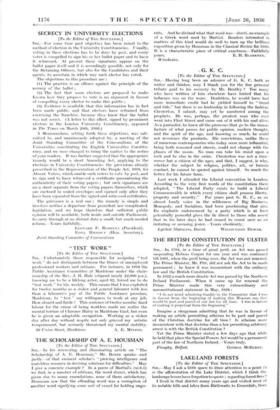SECRECY IN UNIVERSITY ELECTIONS [To the Editor of TILE SPECTATOR.]
.
SI11,—For some time past objection has been raised to the method of election in the University Constituencies. Usually, voting in these elections has to be done by post, and every voter is compelled to sign his or her ballot paper and to have it witnessed. At present these signatures appear on the ballot paper itself and it is accordingly possible, not only for the Returning Officers, but also for the Candidates and their agents, to ascertain in which way each elector has voted.
The objections to this procedure are : (1) The practice is an offence against the principle of the secrecy of the ballot ; (2) The fact that some electors are prepared to make known how they propose to vote is no argument in favour of compelling every elector to make this public ; (3) Evidence is available that this information has in fact been made public, and that electors have refrained from exercising the franchise, because they knew that the ballot was not secret. (A letter to this effect, signed by prominent electors in the London University Constituency, appeared in The Times on March 20th, 1086.) A Memorandum, setting forth these objections, was sub- mitted to, and unanimously adopted by, a meeting of the Joint Standing Committee of the Convocations of the Universities constituting the English Universities Constitu- ency, and we were charged to bring the matter to the notice of your readers. It was further suggested that the appropriate 'remedy would be a short Amending Act, applying to the elections in University Constituencies the provisions already prescribed in the Representation of the People Act, 1918, for Absent Voters, which enable such voters to vote by post, and to sign and to have witnessed a certificate guaranteeing the authenticity of their voting papers ; but such signatures are on a sheet separate from the voting papers themselves, which are enclosed in sealed envelopes and opened only after they have been separated from the signed and witnessed certificates.
The grievance is a real one ; the remedy is simple and involves neither a departure from precedent nor complicated legislation, and we hope therefore that sufficient public opinion will be available, both inside and outside Parliament, to carry through at no distant date a small, but much needed reform.—Yours faithfully,










































 Previous page
Previous page